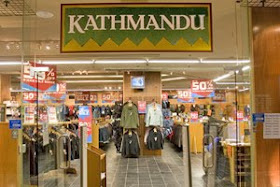 I have been covering the Kathmandu IPO over the last few weeks and am working on the prospectus in between changing nappies and trying to get some sleep.
I have been covering the Kathmandu IPO over the last few weeks and am working on the prospectus in between changing nappies and trying to get some sleep.News out today that Jan Cameron, former owner of Kathmandu, will set up her own outdoor clothing chain in New Zealand and Australia is clearly bad news for the IPO:
Now she has revealed she is well advanced in plans to set up an outdoor clothing business of 60 stores - 30 in New Zealand and 30 in Australia - to compete with Kathmandu next year. She said she was earmarking A$27 million for the venture.
She was even dismissive of the Kathmandu model of regular 50 per cent off sales.
"I imagine that if we are offering a similar product at competitive prices, at everyday low prices, around 50 to 60 per cent lower than Kathmandu, I imagine that might be quite attractive," she said. "I really love the product and the industry and I see an opportunity with a different model.'' More at Stuff.co.nz
Cameron is an individual not to be underestimated when it comes to competition. She has made a career out of buying cheap assets and making money from them and her retail prowess when it comes to starting a business is almost unparalleled.She recently bought up large stakes in Pumpkin Patch Ltd [PPL.NZ] Postie Plus Group [PPG.NZ] and purchased cheap retail sites in Australia abandoned by The Warehouse Group [WHS.NZ] a few years ago and set up a cut price chain.
Her move back into outdoor retailing will affect the value of the Kathmandu IPO to investors because of the direct competition with her old company.
All the figures contained in the prospectus, on which the value of the company is based, are now largely academic due to the new entrant and prospective investors will now have to reassess their position as they contemplate writing out their IPO cheques.
Disclosure: I own PPL and PPG shares.
Related Share Investor Reading
What is Jan Cameron up to?
Kathmandu @ Share Investor
Kathmandu IPO: What is it worth?
Kathmandu IPO: Retail Interest High
Kathmandu IPO: A tough mountain to climb
Kathmandu No.1 but IPO should get the Bullet
Download the detailed Kathmandu Value Cruncher Report - Requires free registration Share Investor Forum to download
Download Kathmandu IPO Prospectus
Discuss Kathmandu at Share Investor Forum
Related Amazon Reading
Initial Public Offerings by Richard F. Kleeburg
Buy new: $26.70 / Used from: $27.70
Usually ships in 24 hours
c Share Investor 2009








